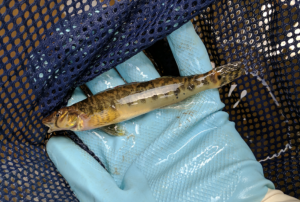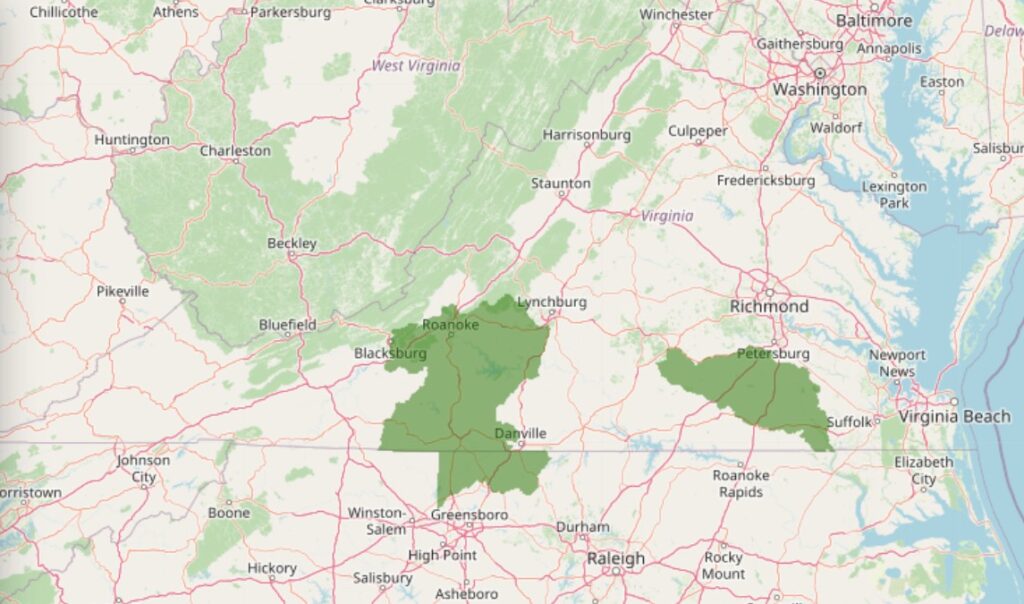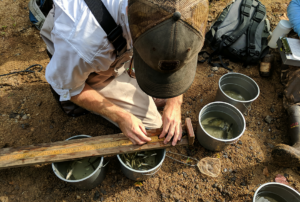Roanoke logperch is a small fish with a big reputation. Our clients may know it from the in-stream work restrictions to protect its habitat in southwestern Virginia and northwestern North Carolina. The endangered fish has resulted in a sometimes lengthy consultation process with the U.S. Fish and Wildlife Service (USFWS) during project permitting. After that process, some projects have gone back to the drawing board to change instream structures and adjust schedules to meet protection requirements. USFWS has proposed delisting the species, which may reduce the federal regulatory restrictions on some projects. The states could still require protection measures, and Wetland Studies and Solutions, Inc. (WSSI) is monitoring the process.
Where Is the Roanoke Logperch?

Roanoke logperch (shown) in WSSI’s 2017 Nottoway River inventory.
The Roanoke logperch (Percina rex, considered king of the logperch because of its relatively long 6-inch body) was listed as endangered in 1989, when it was found in only 14 streams. It’s currently found in 31 Virginia and North Carolina waterways and the USFWS proposes delisting, as it is considered no longer at risk for extinction. Virginia waterways include Goose Creek (Floyd County) and larger streams in the Nottoway, Otter, Pigg, Smith, and upper Roanoke River systems. North Carolina hosts the fish in Big Beaver Island Creek and the Dan, Mayo, and Smith River systems.
The Virginia Department of Wildlife Resources offers a good overview of the Roanoke logperch’s natural history.

Map from https://www.fws.gov/species/roanoke-logperch-percina-rex/map, last accessed April 22, 2024
What Can Delisting Do?
Federal level delisting would remove the need for the USFWS or other federal agencies to address Roanoke logperch protections in their federal actions, including project funding and project permitting.

WSSI staff led a Nottoway River survey for Roanoke logperch and other fish in 2017.
Virginia listed the fish as endangered in 1989, and North Carolina followed suit when it was discovered there in 2007. Either state can impose restrictions in its own permitting processes. Downlisting in either state would require a separate effort from each state.
The USFWS has noted in the Proposed Rule (p. 22658), “There is no reason to expect a change in Federal status would be followed by the States, both of which are currently increasing Roanoke logperch propagation and translocation capacity. Thus, we expect State-level emphasis on protections and population restoration to carry into the future, regardless of the species’ Federal status. Furthermore, there is considerable interest in dam removal in the eastern United States for human safety, fish passage restoration, and river channel restoration. We, therefore, expect removal of dams and other barriers to continue within the range of the Roanoke logperch, regardless of the species’ Federal listing status.”
My Project Underway Has Roanoke Logperch Protections
Decisions made by USFWS before delisting remain in place unless regulatory actions are re-coordinated through a new permitting process. As noted above, state-imposed protections are not likely to change.
Now What?
Interested parties can comment on the proposed delisting on the Regulations.gov website: https://www.regulations.gov/document/FWS-R5-ES-2023-0181-0001
Comments are due June 3.
If you have questions about how this could impact your project, please contact your WSSI project manager or the staff listed below.
Resources
- Proposal to delist Roanoke logperch (USFWS, April 1, 2024)
- To read and comment on the Proposed Rule, visit the gov website: https://www.regulations.gov/document/FWS-R5-ES-2023-0181-0001
- Long Live the King of the Darters, the Roanoke Logperch (Virginia Department of Wildlife Resources, Dec. 6, 2023)
